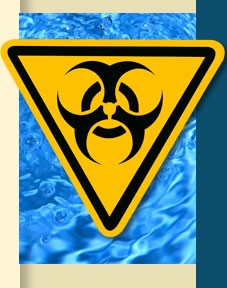Analyzing the Health Risks of Hazardous Chemicals
A new grant of $500,000 to UGA will support research to create a “tool kit” from existing mathematical models—analytical methods that predict the fate of chemicals in the human body and the variety of health and safety risks that may result. This will be the first time that a federal agency has sponsored such an aggregating approach.
 The tool kit, to be developed by Jeffrey Fisher, professor of environmental health science in the College of Public Health, will be used to calculate in particular the effects of solvents. For example, even in cases where residents are provided with bottled water because their water supply is contaminated with solvents, they may still be exposed to the chemicals through inhalation—resulting from the volatile solvents’ off-gassing from the water—rather than through oral ingestion. The model will be valuable in helping to determine the relative contribution from each source of these chemicals.
The tool kit, to be developed by Jeffrey Fisher, professor of environmental health science in the College of Public Health, will be used to calculate in particular the effects of solvents. For example, even in cases where residents are provided with bottled water because their water supply is contaminated with solvents, they may still be exposed to the chemicals through inhalation—resulting from the volatile solvents’ off-gassing from the water—rather than through oral ingestion. The model will be valuable in helping to determine the relative contribution from each source of these chemicals.
A second component of the grant is to create overarching models for selected priority pollutants, such as carbon tetrachloride, benzene, acetone trichloroethylene, PCBs, dioxin, and methyl mercury, in order to determine their effects on pregnant or nursing women.
This cooperative agreement began in September 2007 and will run until September 2012. It is sponsored by the Agency for Toxic Substances and Disease Registry, a sister agency of the Centers for Disease Control and Prevention in Atlanta.
For more information, contact Jeffrey Fisher at: jwfisher@uga.edu
 |

